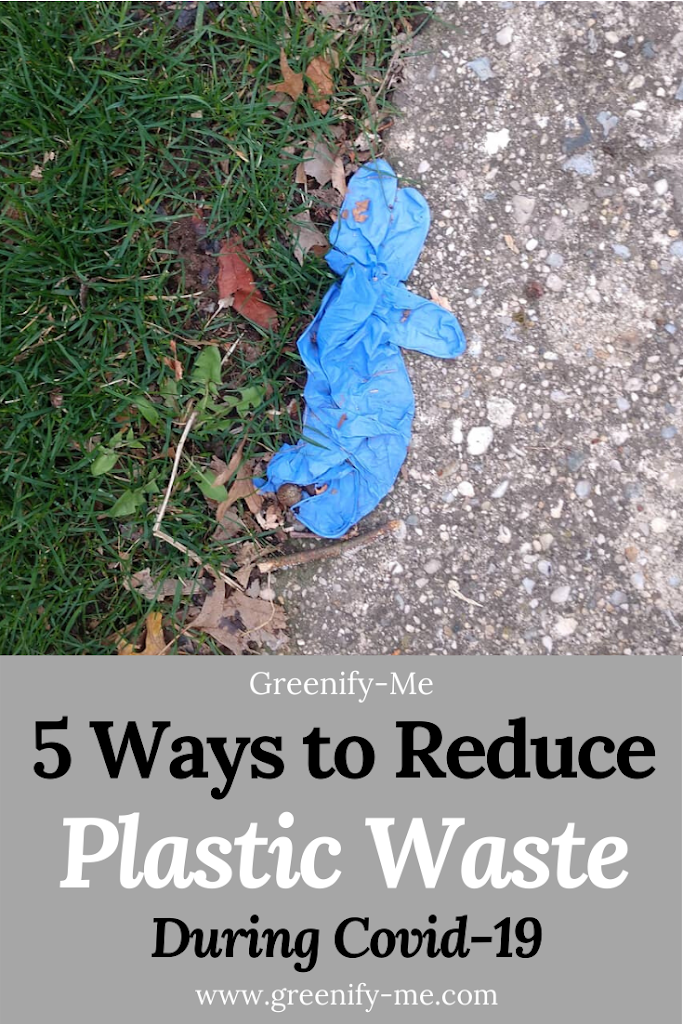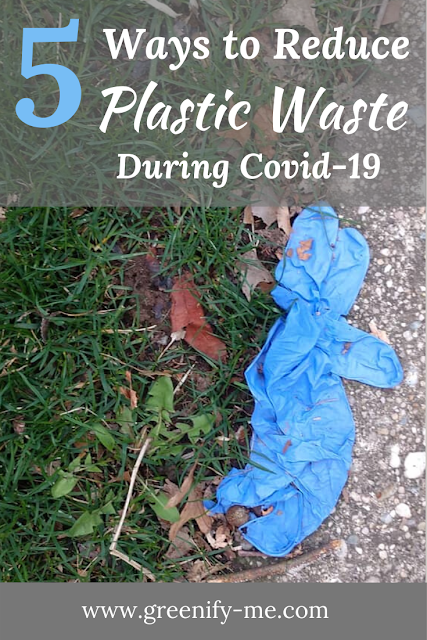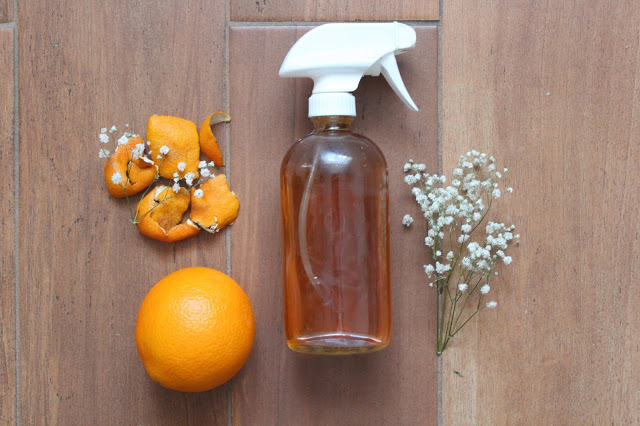Disposable gloves and masks liter the floor; People buying more hand sanitizer in tiny plastic bottles than they know what to do with; States banning reusable bags and reverting to using single use plastic bags. This is our new ‘normal’ and it’s not okay. The amount of plastic waste is surging because of the coronavirus and it’s not a good thing. While it’s true air pollution has been reduced during lock down, plastic waste has gone up. That’s largely because of the fact a lot of protective gear is made from plastic, and most of it is being discarded carelessly. But that’s not the only problem: The plastic industry is taking advantage of the fear and uncertainty in the world to push suspensions and roll backs of environmental measures to reduce plastic pollution, like plastic bag bans. As zero wasters, this can feel like a nightmare. It can make us feel like all our efforts have gone to waste. But there is action we can take to help better the situation. Here are 5 ways to reduce plastic waste during covid-19.
This post contains some affiliate links. This means if you choose to purchase one of these items I will make a very small commission at no extra charge to you. Please see my disclosure policy for more information._____________________
Why should we reduce plastic waste during covid-19?
First off, I just want to say I understand you’re bound to make a little more waste than usual during this difficult time. I am not faulting anyone who needs to buy something in plastic or use a disposable mask.
However, I do believe we should cut back on the amount of waste we produce during this time wherever we can. And there are so many innovative ways to do that.
During this time, the plastic industry is taking full advantage of the situation. They’re using fear as a platform for their products, insisting their products are more sanitary than reusables. Plastic bags, for example, are specifically being pushed as ‘the safer option’ during this time.
Many stores and places have forbid shoppers to bring their own reusable bags. My farmers market isn’t allowing me to use my reusable produce bags, for example.
Some places have even gone so far as to roll back plastic bag bans.
The fear is that the virus will linger on the bags – but is that completely accurate? Not exactly. While there is some possibility the virus can live on reusable bags, these bags can be washed and thus sterilized.
Also, research has found that the coronavirus actually persists longer on plastics than other materials. The virus was detected up to 72 hours after application to plastic (and stainless steel). This suggests paper bags might be less risky than plastic ones.
Also, the plastic bags at the grocery stores have been touched by far more people than the reusable ones we carry to the market. So there’s a higher chance of contamination from the plastic bags being marketed as ‘safe.’
The point I’m trying to make is, the plastic industry is going out of their way to market their products as the better option now more than ever. It’s up to us to not feed into the fear and continue to reduce our plastic consumption as much as we possibly can.
This could mean buying a reusable mask, making your own DIY mask, or simply getting innovative. But one thing is clear: We don’t need more plastic pollution in the world.
Ocean Conservancy scientists worry that if the temporary rollbacks to plastic bans become permanent, it will undermine so many efforts to reduce single-use plastic and increase ocean pollution going forward. This is the last thing we need.
Lets fight for what’s right – without sacrificing our health, or the planet’s.
How can I reduce plastic waste during covid-19?
There are so many innovative ways to combat plastic waste during this challenging time.
Here are some ideas that will inspire you.
1. Cook food from scratch
Use this time to get in the kitchen and cook more homemade foods. When you constantly order out, you tend to produce more waste. The same goes for pre-made, pre-packaged foods.
I know plenty of people who are ordering out more now than ever. While it’s nice to support local businesses every once and a while, we shouldn’t rely on them completely to feed our family.
If you’re craving pizza, try making it yourself! Want a burger? Make your own from scratch (extra points if it’s plant based).
My family has only ordered out once this entire lock down and it was recently for Chinese food. It was well worth it, but we typically cook all our dinners from whatever we have on hand. I was raised on home cooked meals, after all.
Now is a really good time to browse through any cookbooks you have on hand, or discover a new food blogger. I love zero waste chef – she’s got some amazing recipes on her blog!
If you’re looking for some recipe inspiration, try these simple buy yummy plant-based dinner recipes that I regularly whip up:
- Seasonal veggie stir fry with wild rice: Boil some water and a cup or two of wild rice, then let it simmer for 40 minutes. In a pan, stir fry your choice of seasonal veggies with garlic, onion and olive oil until soft. Add salt, pepper, garlic powder and paprika to taste. Combine the stir fried veggies with the wild rice in a big pot once both are ready, mix together to combine, then serve. Optional: Add a can of tomato paste to your rice, along with a little water, mixing until a creamy texture is formed for added flavor.
- Veggie soup with seasonal veggies: In a big pot, bring olive oil, garlic and onion to a sizzle. Add some chopped carrots, celery, and asparagus (if in-season – can sub with chopped peppers or string beans). Mix together and add some salt and pepper to taste. Add in veggie stock and/or water until it covers all the veggies. You can add better than bouillon vegetable base to transform the water into broth if you’d like. Bring the water to a boil, then set to a simmer. Add in spinach or swiss chard, depending on what’s in-season. Kale ripped into small pieces could work too. Add more spices and seasonings as needed – I like to add fresh parsley as well. Let the soup cook on a simmer for at least 1 hour, or until everything is easy to fork. Cook some pastina or rice on the side and add it to the soup afterwards. Remove from heat and serve.
- Roasted root veggies with quinoa: On a baking pan, add chopped garlic, onions, carrots, potatoes, sweet potatoes, and any other root veggies in-season you like. Drizzle some olive oil on them and add your favorite seasonings – I usually coat mine in salt, pepper, paprika, garlic powder, chives and dill. Put it in the oven at around 300 degrees F. Let it cook, checking on it frequently, for about 40 to 45 minutes. Fork them to see if they are done. As that cooks, boil some water and add in a cup or two of quinoa. Strain it once it’s done and add any seasonings you like to it, or some plant based butter. Put the quinoa as a base to your bowl, topping it with your roasted veggies. Serve.
2. Get a reusable cloth mask and reusable gloves
I recommend investing in a reusable mask, if you haven’t already. I got mine from Totally Taylored – an online sustainable shop that transforms fabric scraps, otherwise destined for landfill, into reusable items.
My reusable mask is super cute and very comfortable. I love the fact I’m helping support a small business too. You can use the code GREENIFYME10 to get 10% off your purchase in Totally Taylored’s shop.
Hopefully, the day will come where we won’t have to wear masks in public anymore. That would be amazing. But until then, here are 4 sustainable shops selling reusable cloth masks. If you’re good at sewing, try making your own mask.
If you need gloves, get reusable gloves made from natural rubber. I have these reusable gloves by If You Care – they’re all natural and biodegradable. The same cannot be said for single use disposable gloves!
What’s fantastic about If You Care gloves is that they’re so versatile, so even after the coronavirus pandemic is over, you’ll get a lot of use out of them. You can use them to wash dishes, clean around the house, and garden with them.
I bought the medium sized gloves, but they also come in small and large. They fit me quite nicely. The inside is lightly dusted with cotton for comfort.
You’ll receive two pairs of gloves in a cardboard box which is FSC (Forest Stewardship Council) certified.
Make sure to wash your mask and gloves on a regular basis after use. The masks can be hand washed and air dried. My mom also sprays down our gloves with this zero waste disinfectant spray for good measure.
3. Make your kitchen and bathroom zero waste
Since we’re staying home a lot more than usual right now, now’s a great time to make some zero waste kitchen and bathroom swaps.
I find the kitchen and bathroom to be the most wasteful places in the home. Think about how much time you spend in there, and how many products you go through in each.
From toilet paper to paper towels, there are so many products that produce tons of waste in these areas of our home.
Here are some swaps you should consider making to green your home even more.
Kitchen:
- Unpaper towels – Cut back on your paper towel usage 100%.
- Dish soap block – Wash your dishes the fun, plastic-free way.
- Wooden dish brush – Pair this with a dish soap block and it’ll be extra fun.
- Cloth napkins – Great for wiping your mouth + avoiding waste.
- Vegan wax wraps – Cover and store food without plastic wrap.
- Cloth bowl covers – Great for covering bowls big and small.
- Glassware – Essential for storing leftovers, waste free.
- Stasher bags – Great for packing away lunch, leftovers and/or snacks.
- Compost pail – Put those food scraps to good use.
- Real plates, utensils + cups – Wash those dishes.
- DIY dishwasher detergent – When you’ve had a tough day and don’t want to wash the dishes.
Bathroom:
- TUSHY bidet – helps you reduce the amount of toilet paper you’ll go through.
- Shampoo + conditioner bars – Plastic free hair care essentials.
- Bar soap – Cause liquid body wash in plastic bottles is so last year.
- Safety razor – Who uses plastic razors anymore?
- Menstrual cup – Who needs tampons when you got the Diva Cup?
- – For when you want to have a magical period.
- DIY body lotion – Cause sometimes your skin gets dry.
Related: How to Have a Zero Waste Bathroom
4. Grow your own food, or buy local produce
Personally, I like to do a mix of things. I get produce at my local farmers market, grow a windowsill garden, and also belong to a community garden. Find something that works for you.
5. Get into zero waste cleaning
Now is a great time to switch over to more zero waste cleaning practices. You don’t need harsh chemical cleaners to protect your household from viruses and germs.
All you really need is some zero waste disinfectant spray. It’s relatively easy to make and I did a lot of research into it before making it myself. It will help disinfect your surfaces – and that includes killing viruses (like covid-19) on impact.
Along with that, here are some of my favorite zero waste cleaning products:
- Orange peel vinegar: Simple to make, and a great way to use up leftover citrus peels.
- Toilet cleaner fizzies: A lot of fun to plop in the toilet, if I’m being honest.
- Produce wash: Ridiculously simple way to wash produce.
- Tub scrub: Amazing at scrubbing off grime in the bathroom and kitchen alike.
- Air freshener: Smells fantastic and won’t make you sneeze like a banshee.
- Laundry detergent: Simple, inexpensive, and efficient.
You could also switch over to a more zero waste laundry routine during this time, to further reduce your impact.
So, what do you think of these tips for reducing plastic waste during covid-19?
I think it’s important we reduce waste where we can and remember not to be so quick to fall into old habits simply for convenience purposes.
Also, it’s very important we watch out for fear mongering, and the plastic industry is doing a lot of that right now. So please, where you can, reduce your plastic waste and don’t feed into the fear.
That said, make sure you stay healthy and do what it is you have to do to keep your loved ones healthy too.
And please – do not beat yourself up over the waste you produce during this time. That’s not what I want for you. Just do the best you can, where you can, and keep what I said in the back of your head to make more educated choices.
How are you reducing plastic waste during covid-19?
For more tips during this challenging time, check out my guide to staying zero waste during the coronavirus outbreak.
If you enjoyed this post, be sure to share it! If you like my content, sign up for my newsletter to get notified every time I write a new blog post. To support me even further, please consider buying me a cup of tea to help support my blog.












kellybags onlineshop
If you want to buy gucci bags with good quality and low price, you can choose to buy them here kelly bag